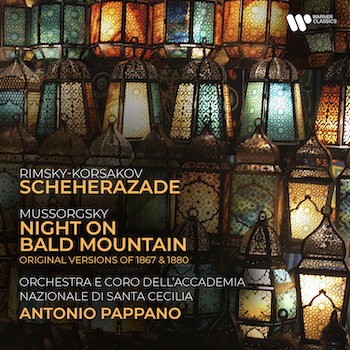Classical Album Reviews: Elder conducts Elgar and Pappano conducts Rimsky-Korsakov and Mussorgsky
By Jonathan Blumhofer
Sir Mark Elder’s latest traversal of Edward Elgar’s two symphonies supplies orchestral playing of the highest level; Sir Antonio Pappano provides plenty of electrifying moments in a pairing of orchestral favorites.
 “In my beginning,” T. S. Eliot famously wrote, “is my end.”
“In my beginning,” T. S. Eliot famously wrote, “is my end.”
There’s a bit of that sentiment at work in Sir Mark Elder’s latest traversal of Edward Elgar’s two symphonies with the Hallé Orchestra: in 2003 & ’04, at the beginning of a quarter-century-long tenure leading the orchestra that ends this summer, the conductor recorded both works for the group’s in-house label. Now, as a farewell present, he revisits them.
What a difference 20 years makes — and what a difference it doesn’t.
In terms of timings and approach, Elder’s Elgar hasn’t changed all that much. The conductor’s grasp of its structure, its sonority, its sense of drama and pacing remains expert. So, too, the quality of the Hallé’s playing, which is, as ever, resplendent.
Where the current accounts stand out from the previous ones is, partly, in the palpable rapport conductor and orchestra have finessed over the years. Rarely, indeed, do such pairings deliver the unity of purpose — balance, articulation, color — we’ve got here. As a result, their readings take on powerfully expressive direction.
The First Symphony is a case in point. Elder and the Hallé’s is a thoroughly lived-in account: the first movement is knowingly focused and directed, its textures lucid, rhythms clear. The fast sections of the second are as crisp, striding, and outstandingly furious as the lyrical theme is lovely.
There and in the Adagio, the Hallé’s tonal blend couldn’t be bettered; especially in this slow movement, the purity of the ensemble’s dovetailed solos is a thing to behold. In the finale, Elgar’s melodic writing emerges thrillingly, both through the dense counterpoint and flak-like barrage before the coda. Those last bars are as exhilarating as under Solti, but here the effect is accomplished without driving the music to within an inch of its life.
The pairing’s performance of the Second might even be better.
Under Elder’s direction, the orchestra’s rendition of the sprawling opening movement is alive to all its nuances of tempo and phrasing. Their take on the great Larghetto is stately, utterly transparent, and wholly unsentimental, while the Rondo’s hammering climax is highlighted by a fascinating blend of languorous melodicism and vigorous rhythms.
If Elder’s take on the finale sacrifices some degree of edge and intensity to highlight its reflective, nostalgic character, well, that’s understandable. Even so, his way with this music — lush and refined — feels right. Besides, the reminiscence of the first movement’s main theme at the end is gorgeous and affecting, and the quiet spots of this whole movement showcase an exquisite intensity one infrequently encounters, live or on tape.
To be sure, then, we’ve got some orchestral playing here that’s simply of the highest level: totally in sync across every section as well as completely unified with the conductor’s interpretive vision. Don’t miss it.
 A few hundred miles from Manchester, in London, Sir Antonio Pappano is set to take the helm of the London Symphony Orchestra this fall. Last year, he stood down as director of Rome’s Orchestra dell’Accademia di Santa Cecilia, but Pappano’s rapport with his old band is on full display in their latest release, a pairing of orchestral favorites by Nikolai Rimsky-Korsakov and Modest Mussorgsky.
A few hundred miles from Manchester, in London, Sir Antonio Pappano is set to take the helm of the London Symphony Orchestra this fall. Last year, he stood down as director of Rome’s Orchestra dell’Accademia di Santa Cecilia, but Pappano’s rapport with his old band is on full display in their latest release, a pairing of orchestral favorites by Nikolai Rimsky-Korsakov and Modest Mussorgsky.
The former’s Scheherazade is no stranger to records or the concert hall (the Boston Symphony, for instance, has presented the score 164 times since 1897). Its latent dramatic form fits well with Pappano’s musical temperament: a longtime fixture in the opera pit, he clearly knows how to shape a musical argument, which pays dividends given the redundancy of some of Scheherazade’s thematic ideas.
In this performance, one hardly minds the repetition. The first movement is shaped into sumptuous, billowing waves of sound. The finale, with its fiery cadenzas, raucous main body, and spirited runs, unfolds with knowing intensity.
“The Young Prince and Princess,” on the other hand, is dreamy, dancing, and beautifully phrased. Best of all is “The Story of the Kalendar Prince,” with its shapely solos; snarling, stormy interludes; frolicsome, buffa-like scherzando episodes; and exquisitely layered textures.
More striking yet are the pair of Mussorgsky selections. The first, the familiar, orchestral Night on Bald Mountain, is predictably ferocious, impish, and weird. The second, a setting of the same narrative material (Satan and his minions appear on the night of St. John’s Eve) for vocal soloists, chorus, and orchestra, is weirder and scarier.
Who knows what’s going on here? Regardless, everything about this performance — from its lusty, rhythmic drive to its clean textures and technical security (some of the vocal writing lies treacherously high) — is electrifying. If Pappano can bring this sort of energy to the Barbican, the LSO and its audiences have much to look forward to.
Jonathan Blumhofer is a composer and violist who has been active in the greater Boston area since 2004. His music has received numerous awards and been performed by various ensembles, including the American Composers Orchestra, Kiev Philharmonic, Camerata Chicago, Xanthos Ensemble, and Juventas New Music Group. Since receiving his doctorate from Boston University in 2010, Jon has taught at Clark University, Worcester Polytechnic Institute, and online for the University of Phoenix, in addition to writing music criticism for the Worcester Telegram & Gazette.
Tagged: Halle Orchestra, Hallé, Sir Antonio Pappano, Sir Mark Elder
